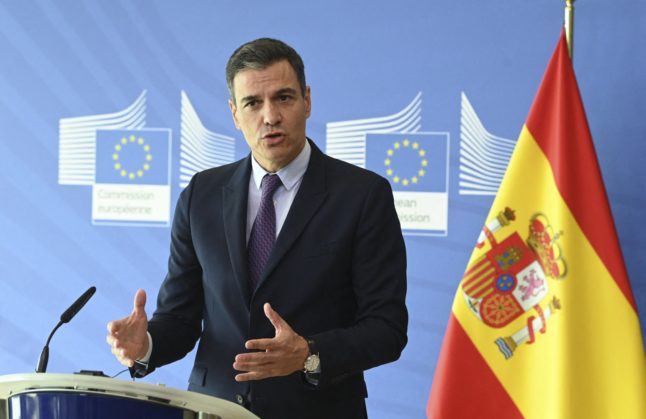Spain’s newly elected Prime Minister Pedro Sánchez and his ruling Socialists (PSOE) have attempted a pivot in political messaging in recent days, and it all revolves around the Spanish flag.
Following the controversial amnesty deal struck with Catalan separatists in order to form a coalition government, thousands of Spaniards took to the streets in outrage to protest what was perceived by some as the selling-out of Spanish democracy.
Many of these protests turned violent and saw swathes arrested and police officers injured. Another common feature of these demonstrations was the Spanish flag, something often seen as an ideological litmus test in Spanish politics. At many demonstrations, pre-constitutional flags from the Franco era were on display.
Flags carry political baggage in Spain. The distinct identities of Spain’s regions are often reflected in their language and customs, but also in their flags. Catalonia has La Senyera (the official regional flag) and La Estelada (the independence flag with the star), the Basque Country has la La Ikurriña, and even less separatist-minded parts of Spain such as Andalusia and the Canary Islands take great pride in their flags.
However, the symbolism of the Spanish national flag – the traditional red and yellow band known as La Rojigualda – is generally associated with right-leaning politics, and often with far-right extremist. During the recent anti-amnesty protests, the connections between the flag and some of the most regressive elements of Spanish society were made clear to all.
READ ALSO: Thousands protest Spain’s separatist amnesty law
”We are Spaniards too’
This monopoly the Spanish right has on the flag is exactly why Sánchez is trying to claim it back. Amid the ongoing controversy about the government’s dependence on separatist forces, Sánchez and the PSOE are now attempting to reclaim the flag from the Spanish right.
At a recent event in Madrid, the PSOE did that by filling the room with Spanish flags and even incorporating it into the party’s motto: España avanza (Spain advances).
It is no coincidence the new Sánchez government chose to do this now, and the incorporation of the flag into a progressive motto speaks to the impact of the recent protests but also the decades-long culture war over flags and symbols in Spain.
It has been interpreted by many political pundits as a bid to stop the appropriation of the rojigualda by Spanish far-right, though critics say this is yet another cynical political ploy from a power hungry leader willing to do anything to cling onto power.
“I love to see Spanish flags here,” Sánchez said at the event, seeking to reframe the symbolism of the flag and link it to a Spain that is “open, tolerant, a lover of social justice, feminist, [and] ecologist.”
READ ALSO: Why do many people see Spain’s flag as a fascist symbol?
“We are Spaniards too,” Sánchez added, directly confronting the political messaging of the Spanish right in recent months, namely that the Partido Popular (PP) and far-right Vox are defending Spaniards from what they describe as terrorists and separatist criminals in cahoots with the PSOE.
The Prime Minister later posted on Twitter/X reaffirming his vision of Spain.
España es un país abierto y tolerante.
España es feminista y ecologista.
España es amante de la paz y la justicia social.
Así que ni Trump, ni Bolsonaro, ni Milei, ni Feijóo ni Abascal.
Va a haber cuatro años más de Gobierno progresista.#EspañaAvanza pic.twitter.com/LOaVSJfeQA
— Pedro Sánchez (@sanchezcastejon) November 26, 2023
However, with many in Spain feeling that his government is dependent on separatists who don’t want to be part of Spain (or even accept the flag), Sánchez will be hoping that by reclaiming it for a progressive message his government can move on from the political rupture caused by the amnesty deal and get down to the business of governing.
It remains to be seen how effective this will be, and unpicking decades of political symbolism will not be easily achieved.
The politicisation of the Spanish flag
After the Second Spanish Republic was proclaimed in 1931, the flag’s second red band was replaced with a purple band to honour the Comuneros of Castile, a group which revolted against King Charles I in 1520. This modified version was used as the Republican flag during the Civil War, while Franco’s army used the traditional yellow and red flag.
After winning the war, Franco added the Eagle of Saint John to the flag (versions of which were common at the recent anti-amnesty protests) and it underwent some very minor changes during the dictatorship (which lasted between 1939 and 1975), but largely remained the same until Spain’s transition to democracy began.
Some historians have suggested that the republican decision not to embrace the Spanish flag and stick by their own creation laid the foundations for the political divides over the flag’s symbolism that would come in later years.
Many left-wing parties across the world have historically had unease with their national flag, not only in Spain. Whether it be in the UK, US, or across Europe, national flags are (whether rightly or wrongly) often associated with nationalism and have been largely monopolised by right wing politics.



 Please whitelist us to continue reading.
Please whitelist us to continue reading.
Member comments